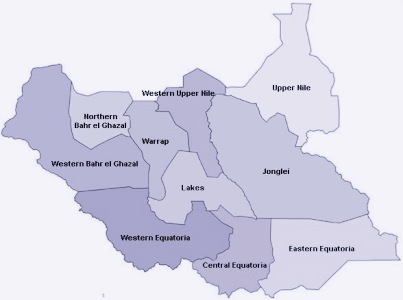Troika countries condemn creation of 28 new states for South Sudan
October 6, 2015 (WASHINGTON) – The troika countries, the United States (US), United Kingdom (UK) and Norway, have condemned unilateral decision taken by president Salva Kiir to abandon the current 10 states and create 28 new states, saying this is in violation of the country’s constitution and the peace agreement he signed with the opposition factions in August.

“This announcement directly contradicts the Government of South Sudan’s commitment to implement the peace agreement it signed on August 26,” reads the troika statement.
The joint statement further explained that the peace agreement signed between president Kiir and armed opposition leader, Riek Machar, plus other stakeholders, was clearly based on the current 10 states, and any unilateral decision by either party to alter its provisions was a clear violation.
It pointed out that such a fundamental matter would be tackled by the would-be formed transitional government of national unity involving all the parties to the agreement in the permanent constitution making process.
“One of the primary tasks of the soon to be formed Transitional Government of National Unity is to initiate and oversee a process to complete a permanent constitution that will address such fundamental issues as the structure of the state,” it said.
The powerful nations, which supported the birth of South Sudan in July 2011, called on president Kiir to immediately cancel his decision and follow the agreed mechanism in the peace deal.
“We recognize that the people of South Sudan have long been interested in the issues of federalism and decentralization. However, we strongly urge President Kiir to defer action on this fundamental matter until the Transitional Government of National Unity is formed and a national constitutional dialogue can take place,” it said.
European Union (EU) on Tuesday equally condemned the unilateral decision by president Kiir, warning that such behavior would result to consequences and called on him to suspend the decree and defer it to the constitution making process by the transitional government of national unity.
Former political detainees also issued a statement condemning president Kiir for what they said was a clear violation of the constitution and the peace deal. In a statement signed by the group’s spokesman, John Luk Jok, he enumerated a number of constitutional provisions which president Kiir violated by issuing the decreeing altering the current constitutional 10 states and renaming them.
He said only the Council of States is given the constitutional power by two-third majority vote to alter the current 10 states, change their names, their capitals and establish their boundaries.
The former detainees called on president Kiir’s government to immediately suspend his unilateral decree and respect the peace agreement by strictly following the mechanisms for addressing the issue.
Major opposition political parties and civil society organizations in South Sudan have also condemned president Kiir’s decree, saying it was violating both the country’s transitional constitution and the peace agreement signed in August.
In a statement on Tuesday, the chairman of the main opposition party, the Sudan People’s Liberation Movement for Democratic Change (SPLM-DC), Lam Akol, who also chairs the alliance of major opposition political parties in South Sudan urged president Kiir to suspend his unilateral decree.
During the 20 months of peace talks, opposition faction led by former vice president, Machar, proposed formation of 21 federal states on the basis of former British colonial districts with their borders as stood on 1st January 1996. The opposition submitted the 21 states proposal to the parties at the peace negotiations in Addis Ababa for adoption and incorporation into the final peace agreement.
However, the government rejected the proposal, saying South Sudan was not ready for federalism or creation of more states.
(ST)
